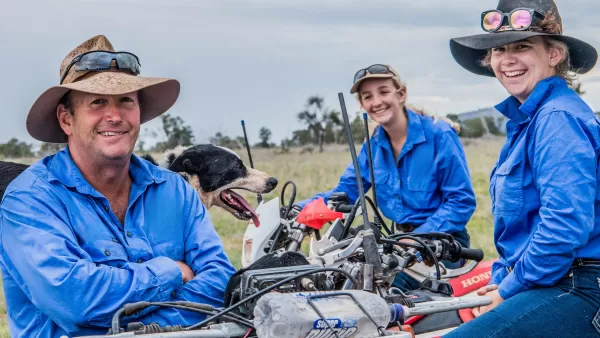Central West Queensland sheep and cattle farm
Energy Savings: 39% | Cost Savings: $3,326 | Capital Cost: $35,438 | CO2 Savings: 10.2 | Project Status: implemented
Industry:
Beef
Location:
Central West
Pump Type:
Bore
Irrigation Type:
Not applicable
Technology:
Irrigation and Pumps, Air Conditioning, Solar Power and Renewables, Batteries and Storage
The farm is generally a low energy user, consuming an average of 32,734kWh per year at a cost of $10,741. The farm has a number of small-bore and transfer pumps for stock watering. The property currently has a 10kW Solar system coupled to 10kWh of battery storage.
A recent energy audit initially identified low-cost easy wins including:
- Replacing the door seals and the light with Weatherproof LED on the cold room.
- The use of a time clock on the hot water system, limiting energy supply to effective sun hours.
- Replace the halogen lighting system with LED lights in the main house.
Table 1. Energy and cost savings from low-cost audit recommendations.
| Recommendations | Cost to Implement ($) | Energy Savings (kWh) | Cost Savings ($) | Payback Period (Years) |
| Replace door seals and light | 520 | 550 | 138 | 3.8 |
| Hot water with time clock | 380 | 1,168 | 295 | 1.3 |
| LED lighting | 530 | 1,052 | 255 | 2.1 |
Low cost wins onsite could lead to a potential energy savings of 2,770kWh and $688 per annum. Replacing both the door seals and the LED lighting is highly recommended showing quick paybacks, with works on the hot water system at the discretion of the farmer.
The farm has the potential for further reductions in energy use and practices change by reducing the time spent from switching of pumps, this could be achieved by:
- Increasing the current battery storage on-site with 2 more units.
- Upgrading the current air conditioning unit in the main house.
- Installing 4G remote monitoring on both bore pumps.
- Installing a 3 kW solar pumping system to handle the bore pump load.
Table 2. Energy and cost savings from audit recommendations.
| Recommendations | Cost to Implement ($) | Energy Savings (kWh) | Cost Savings ($) | Payback Period (Years) | Emission Savings (tCO2-e) |
| Increased Battery Storage | 19,500 | 7,300 | 1,862 | 10 | 5.9 |
| Replace Air Conditioning | 6,950 | 2,188 | 553 | 12.6 | 1.8 |
| Install 2x 4G Remote Monitoring | 3,000 | 1,380 | 364 | 8.2 | 2.4 |
| 3 kW solar pumping system | 8,513 | 2,601 | 773 | 11 | 2.1 |
As the farm has a SWER line connection, the export of power from the solar systems is limited. The inability to receive a rebate due to the incoming SWER line means that any power that is not consumed or stored is essentially lost. The installation of two additional 10kW batteries will allow energy savings of approximately 7,300kWh per annum as excess solar energy generated can be stored. Battery capacity onsite would be increased to 40kW with additional cost savings of $1,862 from changes to the current system. Battery storage is worth considering on most SWER lines and at a payback of 10 years, the farm should apply discretion to implement.
Productivity gains are not limited to an increase in units of output. Due to the location and size of the property, the audit recommended adopting the use of 4G remote monitoring on two pumps. This enables the pumps to be controlled from the farmhouse, negating the distances required to turn the pump off. As the pump can be left running overnight the monitoring will allow a reduction in energy use and more time available to be spent on improving the business in other areas.
The farmer has proceeded with the implementation of the increased battery storage, the solar pumping system, the upgrades in the cold room, and the replacement of the air conditioning unit. Savings will be updated when the measurement and verification process is complete.
By installing the recommendations in the audit, the business could have reduced energy consumption by 39% and costs by 31%, with carbon emission savings of 10.2 tCO2-e per year.
Table 3. Pre and post audit energy and cost savings.
| Metric | Pre-Audit | Post-Audit | Reduction (%) |
| Energy Consumption (kWh) | 32,734 | 20,095 | 39 |
| Cost ($) | 10,741 | 7,415 | 31 |
An energy audit is a good investment
An energy audit is a great way for a business to cut costs and boost productivity.
The Energy Savers Plus Extension Program was delivered by the Queensland Farmers' Federation with support and funding from the Queensland Department of Energy and Public Works.

